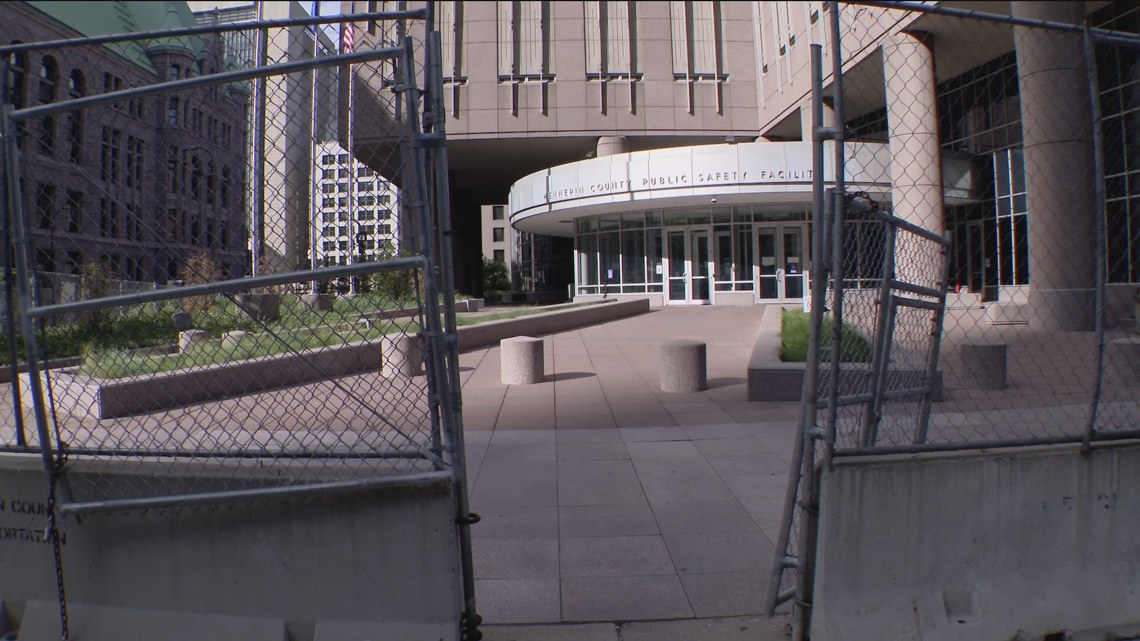Kare11
Search warrant reveals new details in Duluth murder-suicide


Anthony Nephew had previous mental health encounters with law enforcement, including in July.
GOLDEN VALLEY, Minn. — A search warrant obtained by KARE 11 shows new details in an apparent murder-suicide in Duluth last week.
During a law enforcement search for more information, previous encounters with suspected shooter Anthony George Nephew came to light.
That search warrant says on July 3, 2024, officers responded to a home after Nephew’s wife reported him as suicidal. The police report from that night shows that when officers arrived, Nephew was crying and visibly shaken.
The report says Nephew said he needed help, and that he had “attacked” somebody. He later admitted to holding a knife to someone’s neck. Nephew told the officer that he was diagnosed with schizophrenia, and that voices had been telling him that Donald Trump is going to take over the world, and Nephew needed to kill his family to protect them.
Nephew was taken to a hospital, and repeated that if Trump took over, he and his family needed to be killed.
According to the search warrant, just two months later on September 9th, Nephew applied for a permit to purchase a firearm. He was granted that permit the same day.
The rapid nature of Nephew’s permit approval is raising questions for violence prevention experts like Christopher Carita.
“That is the most troubling thing that I see in this case, is that the permitting process did not catch the incident from two months earlier,” Carita, founder of Carita Consulting, said.
We asked Carita about Extreme Risk Protection Orders, which began earlier this year. Those ERPOs aim to temporarily prohibit someone from purchasing or possessing a firearm during a period of crisis when they are at risk of harming themselves or someone else.
Carita says it’s tough to say if this would have helped in this situation, especially considering the circumstances of what happened in July.
“If the suspect wasn’t making any threats regarding firearms, and he was cooperative, which is what it states in the warrant, and was willing to go get help, and there was no other nexus to firearms or threats around firearms, I could see see that seeking mental health care for the suspect and trying to get him the help he needs would have been the appropriate action,” Carita said.
KARE 11 has reached out to both the Duluth Police Department and the St. Louis County Sheriff’s office to clarify who issued the permit to Nephew. We have not heard back at the time of this article’s publishing.
Kare11
Minnesota GOP on board with Trump’s cabinet choices


Minnesota GOP leaders say President-elect Trump has earned the right to shake things up with appointments.
MINNEAPOLIS — President-elect Donald Trump has created a stir with his nominations for cabinet posts, but Minnesota’s top Republicans thus far are on board with the choices he’s made.
House Majority Whip Tom Emmer of Minnesota defends the Trump pick getting the most attention, former Republican Congressman Matt Gaetz of Florida for the post of Attorney General.
“Matt Gaetz is a change agent. He’s going to do a great job!” Rep. Emmer told KARE Friday.
Gaetz resigned from Congress two days before the House Ethics Committee was scheduled to release the results of an investigation into his personal conduct. Emmer agrees with House Speaker Mike Johnson’s decision to bury that report.
“Matt Gaetz was investigated by the Department of Justice, the FBI, and guess what? There was no evidence to charge him with a criminal activity. So. they closed their file,” Emmer remarked.
Democratic Senator Tina Smith said the Senate will need to fully vet Gaetz with a thorough confirmation hearing process.
“Matt Gaetz to be head of the Department of Justice – this is the chief law enforcement officer for the entire country,” Sen. Smith told KARE. “Their job is to enforce the law, and yet it seems he was chosen primarily because of his personal loyalty to the president.”
Trump is pulling in two governors from Minnesota’s neighboring states – Gov. Kristi Noem of South Dakota for Homeland Security Secretary and Gov. Doug Burgum of North Dakota for Secretary of Interior.
Smith said Gov. Burgum may differ with her on policy, but he’s more qualified than other Trump picks. She also said Florida Senator Marco Rubio is also more of a traditional cabinet choice.
But she does take issue with Trump’s nominee for Secretary of Defense, who is Minnesota native Pete Hegseth. He’s an US Army Iraq War veteran who ran for Senate in 2012 and currently hosts a weekend show on FOX.
“I’m also very concerned about the pick of Pete Hegseth at the Department of Defense,” Smith remarked. “This is a huge, huge agency. It is responsible for our country’s national security, keeping people safe, and yet he has virtually no experience in doing that job.”
Emmer derided critics who say Hegseth doesn’t have the right skill set to head the Pentagon.
“It’s amazing that people want to downplay him over the fact he’s just a Fox News host. No. He’s a decorated combat veteran, a real combat veteran.”
Minnesota’s Republican Party Chair David Hann said he trusts the Cabinet vetting process in the US Senate, and that a new president should have discretion over who he likes for these posts.
“He wants to change some of the things that have been the norm in the past politically, and I think people in many cases voted for that when they voted for him,” Hann told KARE. “It was, no question, an historic election in many ways, a realignment. So, I’m willing to give him the benefit of the doubt over who he decides to put in his cabinet.”
Hann’s Democratic counterpart, DFL Chair Ken Martin, called on Republican members of Minnesota’s Congressional delegation to release the House Ethics Committee’s report on its probe into Gaetz.
“The Republicans in Minnesota’s Congressional delegation hold critical roles on the ethics committee and in party leadership, and they almost certainly know what this ethics reports says. If they refuse to tell the public what’s in it, it’s because they have something to hide,” Martin said in a statement released to the media. “The fact that Gaetz’s abrupt resignation two days before the ethics report was supposed to be released raises serious concerns about what the report was going to say.”
Emmer also backs RFK Junior for Secretary of Health and Human Services, and other picks. He believes the 2024 Election created a mandate for Trump to think outside the Beltway box with his nominees.
“President Trump is doing exactly what he campaigned on. He’s going to go outside of this swamp and he’s going to come in and pick people who will actually look into everything in these agencies to bring these people in who are not going to continue to do the same old, same old.”
Kare11
MN homeowners learn impact of city, county, school levy increases


Truth-in-Taxation letters began to go out across the state this week. For some, multiple levy increases are really adding up.
MINNEAPOLIS — Truth-in-Taxation letters have started going out to Minnesota homeowners this week, with a preview of what next year’s property taxes could look like, and for many it has resulted in sticker shock.
“I opened it this morning,” said Jeremy Frisco, who has owned a home in north Minneapolis for six years. “My property taxes have gone from $2,400 to $2,878, and that’s just like, ‘Why is it going up that much?'”
For months, many Minnesota city, county and school district leaders have warned their communities that tax levies would be increasing next year in order to make their budgets work, but it can be hard to figure out how it’s going to hit home for individuals.
In Minneapolis alone, there proposed levy increases of 8.1% by the city, 8.27% by the park board, 5.5% by the Hennepin County, and 4.5% by Minneapolis Public Schools. If you add in the new MPS technology levy passed by voters this month, that could mean Jeremy pays more than $500 more in property taxes this year.
“I haven’t really seen a lot of changes myself and I don’t always have to but you just have to wonder where the heck is that much money going?” he said.
It’s a question that will be asked far beyond just Minneapolis in the days to come, several Twin Cities suburbs have proposed double-digit levy increases and according to the Department of Revenue, preliminary tax levies are headed up statewide.
Levies proposed by Minnesota schools are up 4.4%, townships are up 6.3%, counties are up 6.4% and city levies are up 8.8%, on average.
“The levies have been increasing more than they were eight years ago,” said Nathan Jesson, a tax specialist with the League of Minnesota Cities. “But there’s a lot of different things that play into that.”
Jesson says the sunset of federal, one-time COVID money did drive a lot of the city levy increases, but he said there is another big factor that often gets overlooked.
“It’s not a really big headline that attracts a lot of news but it’s wages and benefits for current employees,” he said. “Just like businesses, cities are employers and that is, a lot of time, what is driving this.”
When it comes to that, Jesson says there is still a little room for adjustment downward.
Jesson: “The final levies don’t get set until the end of December, and they can be lower than your preliminary levy but they cannot be higher, and a lot of times the cities will set their preliminary levy higher because they want some flexibility going into December.”
Erdahl: “Realistically though, the cities don’t usually bring it down a whole lot, right?”
Jesson:”Sure, I mean, you usually see somewhere in the neighborhood of half a point decrease.”
That’s not the only part of the process that’s still to come.
“Cities, before they set their final levy later this month, they have to hold these truth in taxation hearings,” Jesson said. “There’s not always robust turnout at those public hearings but they are happening every year and the cities and counties and school districts all hold their own.”
So if you’re like Jeremy, and still have some questions about that sticker shock you can at least get them answered.
“I want to love my city,” he said. “I still love the people here, I still want to make a difference. It’s just, I want to be a little bit more on board, I want maybe a little bit more transparency.”
The preliminary property tax levy information for local governments and schools is available on the Department of Revenue Property Tax Reports and Data website.
Kare11
Hennepin Co. Jail faces familiar problems


Jails across the country are stretched thin due to staffing shortages, the opioid crisis, COVID and other factors.
MINNEAPOLIS — After receiving an extension from the state, the Hennepin County Sheriff’s Office now has roughly three weeks to fix an overcrowding crisis in its downtown jail facilities.
The Minnesota Department of Corrections placed the Hennepin County Adult Detention Center’s license on conditional status last month and demanded the jail to reduce its population to 600, setting an initial deadline of Nov. 14 before pushing that date back to Dec. 5. In a written order to the county, the state cited seven deaths since 2022 and blamed staffing shortages for the county’s inability “to adequately supervise inmates” and “respond to emergencies.”
Sharon Brooks, founder of a Twin Cities nonprofit “Peace of Hope” that assists families of the incarcerated, said many of her clients do not feel comfortable having relatives in the Hennepin County Jail right now.
“We don’t. We absolutely don’t,” Brooks said. “It’s a broken system.”
However, according to the latest published data, Hennepin County has made substantial progress toward the state’s target population of 600.
As of late Friday afternoon, the county had 667 people in custody at Sheriff’s Office facilities, down from 723 just one day earlier. So far, 186 people have also been annexed to alternate locations, which include the Hennepin County Adult Corrections Facility in Plymouth and neighboring county jails. The largest share of inmates have moved to Wright County.
Hennepin County currently has agreements with five counties to help relocate inmates. Sheriff Dawanna Witt has initiated discussions with 14 other counties as well.
For the incarcerated people and their families, though, the relocation process can be difficult to navigate.
“The strain is tremendous. The not knowing,” Brooks said. “Families are thinking, how will I get to — let’s just say, Wright County or Anoka — how can I get there? And what’s going to happen when I get there?”
The situation in Hennepin County is hardly unprecedented. Last year, the state made similar demands to Ramsey County to reduce jail overcrowding, describing an “immediate risk” to people housed inside the facility.
Across the country, jails have become particularly overwhelmed since the start of the pandemic four years ago.
“They’re dealing with ratios of staff, to incarcerated people, that without a doubt make conditions unsafe,” said Wanda Bertram of the Prison Policy Initiative, which studies mass incarceration. “What we’ve seen since COVID is, understaffing has gotten worse, but it’s a problem — I want to be clear — that goes back decades and decades.”
Bertram specifically cited the case of Nevada, where the state started utilizing drones to make up for staffing shortages. In Hennepin County, Sheriff Dawanna Witt told KARE 11 earlier this year that her agency was down 20 percent in detention deputies.
At the same time, the Prison Policy Initiative has long argued that there are simply too many people in jails that don’t need to be there. Bertram referenced data showing that nearly a quarter of inmates in Hennepin County since March 2020 have been booked on “public order” charges.
Although county data shows more than half of the people currently in Hennepin County custody face serious charges such as assault, homicide and weapons crimes, there is a notable portion — more than 13 percent — facing drug charges, which are sometimes intertwined with mental health struggles.
“There’s a large proportion of people in local jails across the country, that have a serious mental health issue,” Bertram said. “There have been a lot of jails that have attempted to alleviate the problems of jails not being equipped to handle these situations, by adding new facilities, adding new services. Unfortunately, because of the larger issue of staffing shortages — especially in the medical department — they’re not really able to follow through on those initiatives.”
James Stuart, the executive director of the Minnesota Sheriff’s Association, also acknowledges the same problem.
“Certainly the opioid crisis is one of them. The mental health challenges are very significant across the state,” Stuart said, “as we try to find adequate beds.”
In Hennepin County, the clock is ticking toward Dec. 5 for Sheriff Witt to find other beds for Hennepin County inmates, although her agency is only one part of the broader criminal justice system.
Sharon Brooks said she has confidence that Witt can find the right solution to manage jail overcrowding, as long as she’s able to work closely with prosecutors, judges, partner law enforcement agencies and other stakeholders.
“We can do better,” Brooks said. “But we have to face the reality that this is a team effort.”




